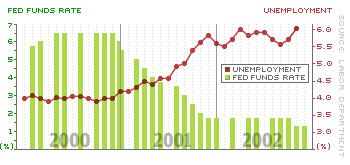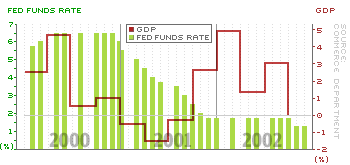NEW YORK (CNN/Money) -
Economically speaking, 2001 was a lousy year and 2002 was only slightly better. Will happy days finally be here again for the U.S. economy in 2003?
The economy seems likely to at least post some improvement. A recent Bond Market Association survey found economists, on average, think gross domestic product will grow at a 3.4 percent annual rate in 2003, compared with estimated growth of 2.8 percent in 2002. GDP is the broadest measure of the nation's economy.
But the true shape of Econ 2003 will depend on the answers to some other critical questions. While this list is by no means exhaustive, and surprises almost certainly will pop up and alter the equation, the following questions are most often raised by economists when thinking about 2003.
Whither Iraq?
The economy's performance hinges, in large part, on whether or not the United States goes to war in Iraq, how well the war goes and how well the post-war period is handled.
"The first and last story has to do with resolving the crisis in Iraq," said Salomon Smith Barney chief economist Bob DiClemente. "Any forecast we do for next year has embedded in it some judgment about how things will go there."
“ It's not just a question of winning the war, but of winning the peace. ”
Robert DiClemente,
Chief economist, Salomon Smith Barney
|
A war would likely hurt the economy in the short run, driving up the price of oil and keeping consumers at home, watching events unfold on CNN or other networks. Consumer spending is crucial, since it fuels about two-thirds of the world's largest economy.
"It will cause something like a state of paralysis on the part of consumers, at least in the near term," said Anthony Chan, chief economist at Banc One Investment Advisors.
Few observers doubt the Iraq situation has already hurt the economy, raising the level of uncertainty in financial markets, weighing on stock prices and keeping some businesses from making long-term plans for spending and hiring workers.
In that sense, a war could actually be good for the economy, if only because it will finally end all the speculation.
"We need to get [the Iraq] issue behind us before the economy can start hitting its stride," said Joel Naroff, president and chief economist of Naroff Economic Advisors.
Most observers expect a quick, successful resolution to the conflict, and that would certainly give a boost to consumer and business confidence. But if the war were to drag on, or if the flow of oil from the Middle East were disrupted, or if terrorists launched massive strikes to protest a U.S. attack on or occupation of Iraq, confidence could be shaken.
"It's not just a question of winning the war, but of winning the peace," said DiClemente of Salomon Smith Barney.
How much stimulus from Congress?
When President Bush makes his State of the Union address in January, he's expected to give Congress his wish list for an economic stimulus package -- including, among other measures, making permanent the tax cuts that were passed last year and are scheduled to expire after 2010.
The economic impact of the package Congress eventually passes will depend on its form and size. There's little clear consensus about the amount of money Congress will spend -- economists cite estimates ranging from $50 billion to $200 billion -- nor is it clear what kind of stimulus will be best for the economy.
 |
|
| Unemployment and key Fed interest rate, 2000-02 |
Some economists say that, in order to keep from completely wrecking the budget, the package should consist of short-term measures that will nurse the economy now and disappear when it's feeling better.
"The economy needs stimulus now, so bring forward some [of the] tax cuts [scheduled for later years], but cancel the last piece scheduled to go into effect in 2008," said Joshua Feinman, chief economist at Deutsche Bank Asset Management. "That would help the short-term economy, and it's better for long-term fiscal probity."
But Bush and some economists argue that temporary tax cuts, or even another one-time rebate, won't encourage spending, since temporary windfalls don't make people or businesses feel richer in the long run.
"Individuals typically respond to a temporary tax rebate by saving it, or, equivalently, using it to pay down debt rather than spending it on increased consumption," Charles Plosser, economics professor and dean of the Simon Graduate School of Business Administration at the University of Rochester, said at a seminar in New York.
As for businesses, whose spending has been called the key to the economy's full recovery, Plosser said, "On-again, off-again tax policy often induces more volatility into business investment, not less."
When will businesses spend again?
But will any fiscal measure get businesses to spend money? After all, the problem with business spending is not necessarily a lack of cash flow.
"What's lacking is confidence, so businesses aren't spending the money they have," said Sung Won Sohn, chief economist at Wells Fargo & Co. "That's why I don't necessarily think it takes a huge fiscal stimulus package to get the economy moving."
One problem is that businesses still have too much production capacity, after going on a spending spree on new technology and plant equipment in the late 1990s. Businesses won't likely buy much more of that stuff until they expect a strong pick-up in demand.
Another problem: Businesses have little leverage to raise prices, which makes it harder to grow profits and forces them to keep costs low.
That means it's been harder for many of the 1.8 million people laid off during the recession to find jobs, which discourages them from spending, thus keeping demand low and dissuading businesses from boosting their spending, spurring a vicious cycle.
"I don't see many firms that are that cash-constrained; they're customer-constrained," said Jared Bernstein, labor economist at the Economic Policy Institute.
If there is some resolution in Iraq, and if fiscal stimulus noticeably boosts consumer spending, then most economists think business spending and hiring could finally recover in 2003. But those are big "ifs."
What will the Fed do?
After 11 rate cuts in 2001 -- a record for a calendar year -- the Federal Reserve was mostly on hold in 2002, waiting for signs that a recovery from 2001's recession was going to last. It didn't, and the Fed was forced to cut rates aggressively again in November.
Rates are now at 40-year lows, the economic equivalent of flooring the gas pedal, since super-low rates make the cost of borrowing dirt-cheap and tend to pump more money into the economy.
 |
|
| GDP growth and key Fed interest rate, 2000-02 |
To keep from flooding the engine and possibly fueling inflation, the Fed might start to take its foot off the pedal as early as next year, as economic growth starts to pick up.
"I'm expecting the Fed's next move will be to tighten," said Wayne Ayers, chief economist at Fleet Boston Financial and a former Fed economist. "They'll do it gradually, but not for another six months -- they'll move in their June [policy] meeting."
Other economists see lingering economic weakness, along with uncertainty about the Iraq situation, and say the Fed could be on the sidelines all year. There's already historical precedent for such a course -- the Fed left rates low all year in 1993, following an aggressive rate-cutting campaign in response to the 1990-91 recession and 1992's "jobless" recovery.
The timing of any Fed rate hike would partly depend on how much Congress decides to break the bank when lawmakers throw tax cuts and spending programs at the economy.
"If stimulus that was passed when the economy was weak takes effect when the economy is on firmer footing, that could be more stimulus than we need," said Merrill Lynch senior economist Gerald Cohen. That may lead to an undesirable, inflationary burst of economic growth.
"That could cause the Fed to raise rates faster," Cohen said.

|

